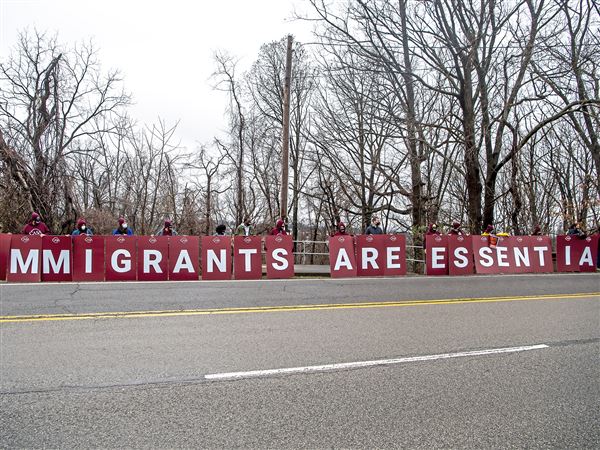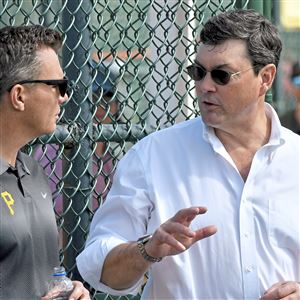Former Allegheny County Coroner Dr. Cyril H. Wecht got his own mixed verdict yesterday from the 3rd U.S. Circuit Court of Appeals.
The three-judge panel found that Dr. Wecht can be retried on 41 criminal counts against him, but the retrial will be before a different judge.
Even though the government immediately said it would retry Dr. Wecht when the hung jury was declared in April, yesterday when asked if that was still the case, U.S. Attorney Mary Beth Buchanan refused to answer the question.
Defense attorney Jerry McDevitt hopes that the appeals court's strongly worded opinion leads to the dismissal of the charges -- either by the U.S. attorney or by the new judge who will hear them.
"If the United States attorney does not cease this prosecution, we hope the fresh set of eyes on the case in the form of a new judge ... will listen and fairly decide other arguments available to us that Dr. Wecht was, in fact, entitled to a judgment of acquittal as a matter of law following the first trial," Mr. McDevitt said in a written statement.
The Third Circuit issued its 44-page opinion denying Dr. Wecht's motion to dismiss the case against him based on double jeopardy. But Judges D. Michael Fisher, D. Brooks Smith and Senior Judge Franklin S. Van Antwerpen agree unanimously to remove U.S. District Judge Arthur J. Schwab from the case.
They didn't find bias but said that the case was so full of "rancor," that appointing a new judge was necessary.
"[The] problem today is not so much the appearance of bias as it is the appearance of litigation at a combative tenor that likely will not abate were Judge Schwab to stay on the case," wrote Judge Fisher. "We therefore direct that a less invested adjudicator take over from here."
It will be up to Chief Judge Donetta W. Ambrose to reassign the case, but that has not happened yet.
In the 30 months since the charges were brought against Dr. Wecht accusing him of using his public office to run his private autopsy business, the case has been before the Third Circuit three times, and defense attorneys have filed three motions to remove Judge Schwab.
The first trial, which began in January, ended with a hung jury April 8.
When Judge Schwab declared the mistrial, he did not show the attorneys the note from the jurors, in which they said that they were "essentially" deadlocked.
Dr. Wecht's defense attorney, Jerry McDevitt, said that that language is different from that used by Judge Schwab, who called the jurors "hopelessly" deadlocked.
He also complained that Judge Schwab did not poll the individual jurors or question the foreman. Because of all those things, it was unclear if the jurors could have reached a partial verdict.
Mr. McDevitt asked the Third Circuit to dismiss the charges based on double jeopardy, the legal concept that a person can only be tried once for the same crime.
The appeals court found that Judge Schwab was correct in declaring the mistrial even if he didn't follow procedural rules to the letter.
"[In] today's decision, even though there was manifest necessity to declare a mistrial in satisfaction of the Fifth Amendment, the District Court reached that conclusion through a highly flawed set of procedures," they wrote.
Judge Schwab was out of town at a board of judges meeting and unavailable to comment.
Robert L. Byer, a former judge and attorney who specializes in appellate law, said the judge should not feel bad that he was removed.
"Judge Schwab was not recused, not removed for bias, but under their supervisory power," Mr. Byer said. "I don't think very many people would quibble with that. And if I were Judge Schwab, I'd be relieved, quite frankly."
From almost the beginning, the case before Judge Schwab was highly charged. Court hearings and even written filings were often filled with angry language and hostility from both sides.
At one point, Judge Schwab handled everything in the case through written filings instead of convening court hearings.
"Maybe the judge was goaded, but maybe the judge was a participant," Mr. Byer said. "And judges are supposed to rise above that."
The appeals court indicated the same thing.
"This has been a highly charged, lengthy, and complex case involving serious criminal charges brought against a prominent public figure," the court wrote. "The trial judge has been the referee in a heavyweight fight, and, as we have ruled, has generally made the correct calls, with some exceptions."
Ms. Buchanan would not comment on the court's decision to remove Judge Schwab. She instead issued only a brief statement.
"The government is pleased that the Court of Appeals accepted our position and reached the conclusion that the double jeopardy clause does not preclude a retrial in this case," Ms. Buchanan said.
When asked, specifically, if she would retry Dr. Wecht, she said she was sticking to her statement and would not say anything further.
In its opinion, the Third Circuit said that a retrial isn't required.
"Our holding today that there is no constitutional bar to retrying Dr. Wecht does not stand for the proposition that he must be retried," the court wrote. "If the Government chooses to proceed with a retrial, our view is that both sides and the interest of justice would benefit from a reduced level of rancor in the courtroom, fresh eyes on the case, and fewer forays to this Court by the parties, including intervening parties."
Mr. Byer said that passage in the opinion jumped out at him as highly unusual.
"I've never seen that before," he said. "I think they sent a very pointed message to the government -- think twice before you decide to retry this case."
Ms Buchanan's refusal to confirm that Dr. Wecht would be retried might be because she is waiting for direction from Washington, D.C., Mr. Byer speculated.
"I would hope the Department of Justice would give some sober second thought with respect to trying this case," he said.
Mr. Byer said he doubts that there is a federal crime in Dr. Wecht's activities.
"If there is, it's a very minor charge, particularly in view of the resources the government has brought to bear," he said. "The punishment -- the economic harm to the defendant -- is totally out of proportion with the gravity of the offenses the government has charged."
Mr. McDevitt would like Ms. Buchanan to heed the appeals court's comments on the idea of a retrial.
"In the spirit of that aspect of the decision, we hope the United States Attorney's Office dispassionately considers whether to do so and ceases this prosecution of Dr. Wecht which, as the Court noted, has already spanned 30 months," he said. "This case has resulted in the expenditure of millions of dollars by both sides, and has not secured a conviction on so much as a single count of the 84 charges originally made against Dr. Wecht."
First Published: September 6, 2008, 8:00 a.m.















